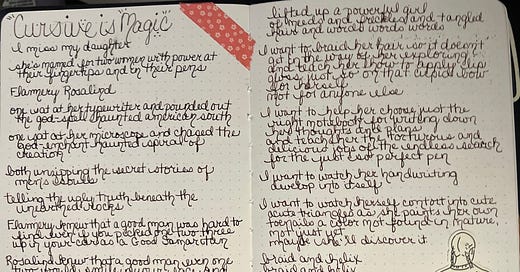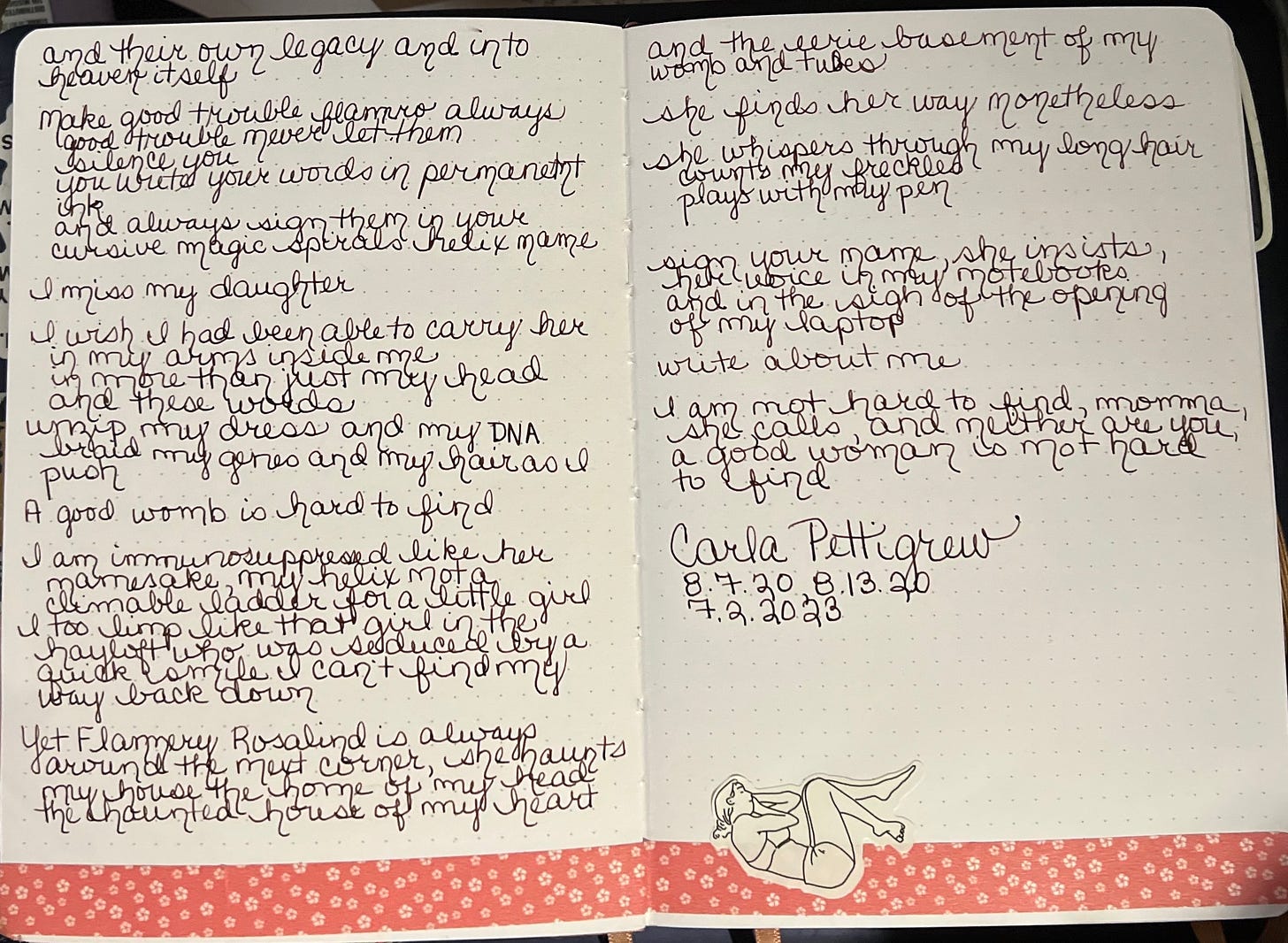Cursive is Magic: Poem
a poem inspired by Patton Oswalt (no, really, and it's not what you think)
Content warning: infertility.
Poem first, explanation (and Patton) to follow.
Braided Into My DNA
I miss my daughter
she's named for two women with power at their fingertips and in their pens
Flannery Rosalind
one sat at her typewriter and pounded out the god-spell haunted american south
one sat at her microscope and chased the god-enchant haunted spiral of creation
both unzipping the secret stories of men's souls
telling the ugly truth beneath the unearthed rocks
Flannery knew that yes a good man was hard to find even if you picked one two three up in your car as a Good Samaritan
Rosalind knew that a good man even one two three would smile in your face and steal your work from you
Unzipping your dress
Unzipping the fabric of creation
Putting their names together those lives of creation of frustration lifted up a powerful girl of needs and freckles and tangled hair and words words words
I want to braid her hair so it doesn't get in the way of her exploring and teach her how to apply lip gloss just so on that cupid bow for herself not for anyone else
I want to help her choose just the right notebook for writing down her thoughts and plans and teach her the torturous and delicious joys of the endless search for the just so perfect pen
I want to watch her handwriting develop into itself
I want to watch herself contort into cute acute triangles as she paints her own toenails a color not found in nature, not just yet, maybe she'll discover it
braid and helix braid and helix
cursive is magic sign your full name Flannery Rosalind tell them you were here turn it into braids and doodles and flower art and climbing spiral staircases into haylofts where girls regain their stolen legs and their own legacy and into heaven itself
Make good trouble flannro always good trouble never let them silence you write your words in permanent ink and always sign them in your cursive magic spirals helix name
I miss my daughter
I wish I had been able to carry her in my arms inside me in more than just my head and these words unzip my dress and my DNA braid my genes and my hair as I push
A good womb is hard to find
I am immunosuppressed like her namesake, my helix not a climbable ladder for a little girl I too limp like that girl in the hayloft who was seduced by a quick smile I can't find my way back down
Yet Flannery Rosalind is always around the next corner, she haunts my house the home of my head the haunted house of my heart and the eerie basement of my scarred womb and tubes
she finds her way nonetheless
she whispers through my long hair counts my freckles plays with my pen
sign your name, she insists, her voice in my notebooks and in the sigh of the opening of my laptop
write about me
I am not hard to find, momma, she calls, and neither are you, a good woman is not hard to find
8.7.20, 8.13.20, edited 7.2.2023
Patton Oswalt has a routine called, yes, “Cursive is Magic”, joking about how amazing it is that once we write our name in cursive on a document, it’s legal binding, poof. Plus, nowadays, if you write in cursive, some people can’t read it. Magic! I started tagging any photo of my journals #cursiveismagic on Instagram, and messaged him (I’d talked to him before when I was the creator for The Dollop’s website (which still exists on mine) and we have mutual friends, including Greg Behrendt, who inspired the name of my podcast which his routine. “There Might Be Cake”.) He loved it so I kept it up, since it amused us both. I checked it, and almost every single post is my art or my writing.
Then that idea, and my journey from the fertility doctor to being chronically ill and disabled inspired this poem, which he also loves. I owe him a copy of it in my own cursive, so I thought two birds, yeah yeah, and I would share it here.
The short version of that journey is this:
I had wanted to be a mother myself since I was two, and announced at the dinner table: “I want to be a mommy…but I don’t want to get married, I think.” I made my Dad almost choke on his waffle.
Listeners of my podcast already know I was a peculiar and preternaturally intelligent child—kinda spooky package with the introversion and silence and crippling shyness around other people. Wednesday Addams with a bright yellow bedroom and a Shaun Cassidy t-shirt. Barbies but also a subscription to Twilight Zone magazine in elementary school. So strange proclamations like that came out of my small mouth all of the time. Still choked Dad up. Man just wanted to eat.
When motherhood didn’t happen by a Certain Age, I went to the fertility clinic attached to the Children’s Hospital in Hampton Roads, Virginia. All the tests were done. They felt confident. We moved to outside the Charlottesville area, and continued the journey with a fertility doctor here…that luckily had a background in immunology. He did that one test where they force reactive fluid through your reproductive organs and image them…and he was in shock. He said my Fallopian tubes looked like they had been eaten from the inside. “Chewed” and “Swiss cheese” were used.
They had been. Luckily, he told me this in front of my mother, because when I am shocked like that, I freeze and people-please, and so am useless (a story for another time). Because he said you usually only ever see such a thing in people with autoimmune disorders. And Mom immediately piped up: “Her brother had a severe case of Addison’s disease; he was already showing symptoms in the womb, which I understand is rare.”
The doctor slowly and solemnly answered her, “It indeed is,” then they both turned to look at me…and my life has never been the same. I became infertile and chronically ill on the same day, having to hold those two horrible and identity-changing ideas in my head without going mad.
That was…2010 or so, I think (my memory for such things is bad; brain fog is the cross-eyed bear it has given to me—sorry, Alanis joke), and I have to hold many awful ideas about my body and its capabilities in my head since then. I had to leave work as an officially disabled person in 2014, no longer the therapist I was trained to be ever again as well as not a mother. I left my beloved little office in an ambulance with nitro under my tongue, having my first of many cardiac events thanks to POTS. Ehlers-Danlos is the internal shark that attacked my tubes (and other organs; it is a disorder of the collagen, which is in all twelve body systems, which means…my body doesn’t work).
Six years later, with Patton’s phrase in my mind, and mostly resolved grief, I wrote this poem for my spiritual daughter. She has my thick hair that was hard-to-brush as a child, and my odd freckles from my Scottish and Irish (clan Stuart, for another essay) heritage; I have the Little Dipper on my left arm.
Following is the poem in my cursive for Patton, delivering my digital copy as promised, written in my commonplace book with my Faber-Castell fountain pen in my favorite warm brown ink. Yes, I signed my name with a flourish.
Note: washi tape is a great forgiver of mistakes. So I just went for it for the rest to make it uniform. Plus, it’s a good marker for the rest of the book—easy to find the poem now. And I liked the idea of my daughter coming along and decorating it when I wasn’t looking, as kids do, including the flourishes around the title. 😀 Patton, if you wish, I will scan these in for you, so you won’t have the darknesses of my desk and the edge of my notebook.
I have come to accept that my handwriting wavers now, with fatigue, with uneven eyesight, with not-always-controllable fingers, with not-always-controllable messages from brain to hand. That’s been a journey as well, of a different sort. But I am still pleased with this.
Flannery O’Connor short stories referenced: “A Good Man is Hard to Find” and “Good Country People”, in The Complete Stories of Flannery O’Connor
Rosalind Franklin: The Dark Lady of DNA by Brenda Maddox: “In 1962, Maurice Wilkins, Francis Crick, and James Watson received the Nobel Prize, but it was Rosalind Franklin's data and photographs of DNA that led to their discovery.
Brenda Maddox tells a powerful story of a remarkably single-minded, forthright, and tempestuous young woman who, at the age of fifteen, decided she was going to be a scientist, but who was airbrushed out of the greatest scientific discovery of the twentieth century.”
Flannery O’Connor died from complications of lupus, also an autoimmune disorder, at the age of 39.
I may expand this into a podcast entry, tell both these women’s stories, and more of my own, and so you can hear me read my own work. I shall have a think.
, let’s have a Flannery O’Connor class, yes? Southern Gothic, please. So much there there. ?





